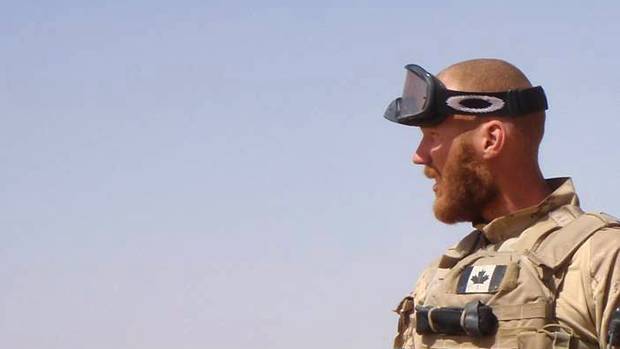Sergeant Andrew Doiron’s last words, as Kurdish fighters prepared to fire on him in the evening dark of northern Iraq, were an effort to persuade his allies that he was one of the good guys.
“Wow, wow, wow, Canada,” he shouted just before the peshmerga fatally shot him and wounded three other members of his patrol on March 6.
The Canadian Forces released heavily censored reports from several military investigations into the death of Sgt. Doiron, 31, on Tuesday in an attempt to lay to rest questions about how the special-forces soldier died at the hands of Canada’s allies.
The military officially described the friendly fire death as a “tragic case of mistaken identity” and absolved Canada of blame while pointing the finger at the Kurds for communications errors they made on the front lines in the battle against Islamic militants.
But important questions remain unanswered including whether the Kurdish soldier who killed Sgt. Doiron will face discipline or punishment.
The peshmerga fighters who mistakenly shot and killed Sgt. Doiron had been expecting an attack from Islamic militants that evening, investigators say. A shift change meant the Kurds did not know the Canadian soldier and his comrades would be visiting their position at 11 p.m.
“A breakdown in communication in a setting characterized by tension, fatigue and confusion” were the leading cause of the soldier’s death, the Forces say.
The Canadians had been stopping at Kurdish fighting positions along the front line, dozens of kilometres west of Erbil, as part of their advise-and-assist mission in the region.
They’d made arrangements to return to a particular location after thepeshmerga told them “they had been attacked the night before and were weary and tired and … required some assistance.”
The probes said the Canadians used proper signals to identify themselves to the Kurds as they approached each defensive position – an effort made more difficult by the late hour. “The identification procedures used by Sgt. Doiron and his detachment were wholly consistent with what had been used since the start of the mission in October, 2014, and were well practised with the Kurdish forces,” investigators say.
The probes also demonstrated, inadvertently, how far Canada’s advise-and-assist mission in northern Iraq has strayed from the low-risk deployment the government advertised last year. “We’re dealing with a training mission, and here we have Canadian soldiers apparently travelling alone – 11 at night in the dark – without proper support,” NDP defence critic Jack Harris noted.
The reports, without stating as much, are a rebuttal of Kurdish criticism of Canadians’ conduct in the incident, which initially drove a wedge between the allies. Shortly after the tragic event, a Kurdish commander blamed Canada for the misunderstanding, saying they showed up unannounced and spooked Kurds by speaking Arabic – conduct that made the peshmerga think they were the enemy.
Investigators found that trouble started on the night in question shortly after the Canadians began their approach to the Kurdish position.
“They were set upon by a pack of wild dogs that made a lot of noise,” Brigadier-General Michael Rouleau told reporters at a briefing Tuesday. “They succeeded in shooing the dogs away but we assume this only heightened an already very nervous group of Kurdish soldiers who believed they would be attacked by [Islamic State] that night,” he said.
The patrol continued until a Kurdish soldier on a rooftop saw them – and everything fell apart. Sgt. Doiron used the appropriate greeting but got no response. The peshmerga cocked his weapon and the special-forces soldier tried in vain to persuade him the patrol was Canadian.
“The Kurdish soldier fired at Sgt. Doiron, wounding him immediately,” Brig.-Gen. Rouleau said. Then another peshmerga joined in, swivelling a machine gun 180 degrees to train fire on the Canadians. Sgt. Doiron and his patrol never fired back.
The reports are exceptionally secretive in some respects, even censoring Sgt. Doiron’s time of death.
They are exceptionally open about other details that might, for instance, rebut Kurdish criticism that the Canadians had confused their allies by speaking Arabic before the attack.
“It was also determined that no Arabic was spoken by the [special forces] operators on the approach to the final position that night, and that Arabic was only spoken after the accident, during the co-ordination of the medevac.”
It’s unclear if the peshmerga responsible for the shooting will face discipline.
When Prime Minister Stephen Harper visited Iraq in early May, he was emphatic the accident shouldn’t overshadow Canada’s relations with the Kurds.
The military clearly feels the same way.
Investigators rejected convening a board of inquiry – a more exhaustive probe that has been established to analyze previous friendly fire deaths – saying it would bring “no further clarity on the situation” for the Forces.
“I know there’s a natural human tendency to want to ascribe blame in this incident but that Kurdish soldier did not wake up that morning hoping to kill a Canadian,” Brig.-Gen. Rouleau said.
“It’s a case of a tragic accident brought on by a certain amount of miscommunication and misidentification.”
STEVEN CHASE
OTTAWA — The Globe and Mail
Published Tuesday, May. 12 2015, 4:01 PM EDT
Last updated Wednesday, May. 13 2015, 4:51 AM EDT

